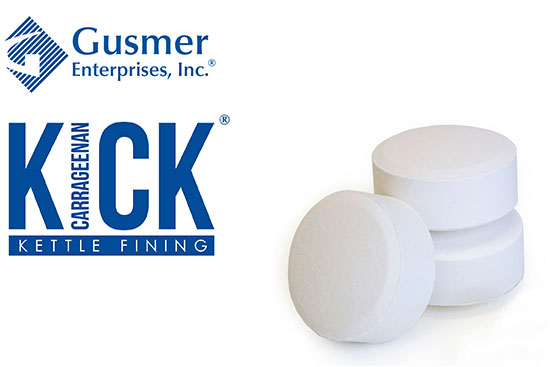The warming and cooling of beer in the brewing process and after packaging can lead to a lack of clarity and haze. There are various ways to combat this. A wort chiller, cold storage, highly flocculant yeast and beyond. There are also fining agents, which are brewing aids added to unfiltered beer to remove protein haze and yeast. There are all types of fining agents and products, which makes it a little daunting to choose. Here’s just a simple list. With all products, there are pros and cons. Isinglass, for instance, is made from dried swim bladders of fish, so it’s not vegan friendly. Which to choose?
Chicago’s Revolution Brewing Co. uses finings to help supplement its clarification process. Jim Cibak, brewmaster at the Chicago craft brewery, is a fan of KICK Carrageenan and Nalco 1072 — products he sources from Gusmer — an expert supplier of processing aids and fermentation equipment. Revolution Brewing uses a centrifuge to clarify its beer, but the centrifuge can’t process tanks of yeasty, hop-laden beer day in and day out.
“For us to clarify our beers here at Revolution Brewing Company,” explains Cibak in the video above, “our main clarification device is the centrifuge, and it’s on the smaller side. So, where we start our clarification process is by adding KICK in the last 10 minutes of the boil. This is where we’re settling out a lot of haze forming proteins and other particles into a tight pile in the whirlpool, and then we’re trying to separate as much clear wort to the fermentation tank as possible.”
KICK Carrageenan kettle finings improve clarity and flocculation of proteins in the whirlpool and in the fermentation tank, as well. The active ingredient in KICK is kappa carrageenan, a high molecular weight polysaccharide derived from red seaweed. When added near the end of the boil, kappa carrageenan binds to haze-forming proteins and other small particles and flocculates, rapidly resulting in improved wort and beer clarity.

Revolution then utilizes Nalco 1072 in the fermentation process.
“What we do in the fermentation tank is, when the fermentation is complete — the dry hops have been dumped out of the tank and the tank is crashed so it’s at 32 degrees — what we’ll do is dump out any yeast and hops one more time,” explains Cibak in the video. “And then we add Nalco finings to the top of the tank, and then gently rouse from the bottom to mix it up properly. Depending on the tank size, for a 120-bbl tank, it’s like a minimum of one to two days. For a 240-bbl tank, it’s about three to four days. And for our 800-lb tanks out back, it takes about five to six to seven days for it to really settle out properly. But then that allows us to run the beer through our smaller centrifuge here at Revolution and still clarify this beer because we’re just using the centrifuge as a polishing tool.”
Nalco 1072 kieselsol is a liquid colloidal suspension of silicon dioxide, which is extremely effective in chill proofing and has been used in production of those vegan-friendly beers we just discussed above. The resulting silica/protein complexes form relatively compact sediment cakes in the tank bottoms that aid in separation from the stabilized beer. Both are super easy to dose and use.
“Kick is where our clarification process starts, and that is in the brewhouse,” says Cibak. “Then Nalco in the fermentation really really helps to drop that beer out nice and clear, so they’re a very powerful duo when it comes to clarifying beer.”
Check out more info on KICK here and Nalco 1072 here. Or maybe just watch that video above.





Leave a Reply
You must be logged in to post a comment.